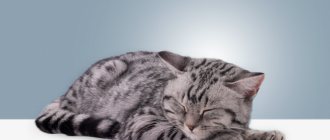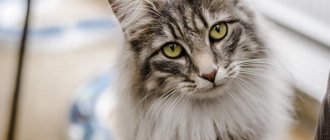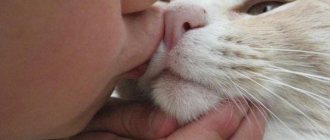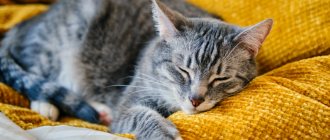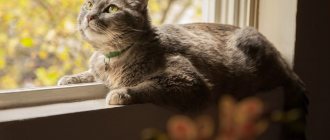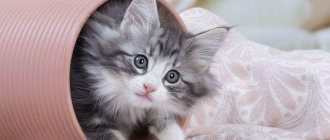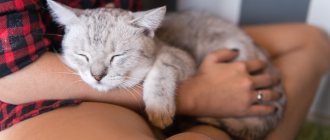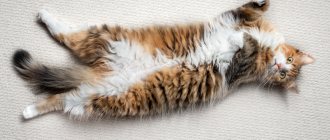It is important for a cat to bring prey to its native doorstep
If you let your pet go for a walk outside, then be prepared for the fact that he will not just peacefully stroll around the site. Even the most well-fed cat will never miss the opportunity to chase a bird or rodent. First of all, instinct pushes him to do this.
The cat’s need to take the trophy home is explained by the fact that it is very strongly attached to the territory in which it lives. This is a manifestation of the so-called territorial instinct. The pet feels uncomfortable outside its home. He realizes that he can easily lose the trophy. If the cat is currently full, then he does not need to immediately eat his prey. Therefore, he strives to take her to a familiar and safe place.
Many domestic cats hunt only for entertainment, and specifically bring trophies into their territory. They serve as a kind of warning to potential enemies. Killed victims scattered around the area are proof of the cat's strength and dexterity. The pet thus shows that it awaits those who dare to encroach on its territory. This behavior is characteristic mainly of males. Females do not leave prey on the site; they always try to bring it into the house.
About hidden threats
Cats should not bring caught animals into the house, because they can greatly frighten the owner. Of course, this rarely happens, and if the owner is a hunter himself, then no mouse will scare him. But other owners, especially if they are female, may suffer from ornithophobia (fear of rats, birds, mice).
Another danger that such pet gifts pose is diseases carried by rodents. For cats themselves, the worst of them is leptospirosis. Cats die from this disease. Rats are often carriers of distemper and rabies, which also cause death in pets.
It is worth noting that the hunting instinct of cats sometimes develops on a global scale. We are talking about the fact that animals begin to hunt chickens, chicks, and ducklings in the neighbor's barn. And this already threatens the owners with scandals with their neighbors.
One of the reasons why the owner must control the hunting instinct of his pet is if one of the residents of the house or apartment has musophobia (fear of rats and mice) or ornithophobia (fear of birds). Phobias are not nonsense or fiction: often irrational fear forces people to commit rash acts, because of which an innocent pet can suffer.
Another type of threat lies in wait for the cats themselves - these are diseases carried by animals from the street. From rats and mice you can become infected with rabies and distemper, as well as subcutaneous pests - ticks and lice, which, in turn, carry various viruses. In addition, there is a high probability that an animal caught by a cat will be poisoned with rat poison, and then your pet will become a victim of rodent poisoning. Birds can be carriers of fungal infections. Contact with any street animal can cause infection with worms.
Potential Hazards
Is it safe for a cat to indulge in hunting? Not as much as you would like.
Rats, often the prey of cats, are carriers of diseases such as rabies and distemper; they can also be intermediate hosts of fleas and ticks, which are often carriers of piroplasmosis and encephalitis. Birds often carry subcutaneous mites and fungal infections. In addition, street animals can “give” worms to your pet. In cities, rodents are periodically poisoned with rat poison, which, when it enters the cat’s body, kills it.
Owners have phobias of rodents and birds. Phobias should not be confused with fears. The former make a person lose control of himself and cause many unpleasant emotions and problems. If the owner has such deviations, the cat that brought a “gift” into the house may be given to someone else or even thrown out into the street.
Mice in the diet - harm or benefit
Rodents are as beneficial as they are harmful to cats, at least according to veterinarians who are concerned about the “bouquet” of diseases transmitted by the former. It is believed that mice (like rats) are carriers of infectious diseases that are dangerous both for the pets themselves and for their owners.
The list of such diseases includes:
- trichinosis - difficult to treat and caused by helminths that parasitize the intestines (larvae penetrate muscle tissue and destroy it);
- ringworm ( ringworm ) is a fungal infection that affects the appearance of the coat/skin. The therapy is simple but long-lasting;
- leptospirosis - affects various organs and is accompanied by fever. A cat becomes infected through contaminated water, eating mice or coming into contact with their secretions;
- toxoplasmosis is dangerous for pregnant women and is often asymptomatic. About 50% of rodents are considered carriers of the disease;
- salmonellosis is an acute intestinal infection that threatens humans and animals;
- tularemia , pseudotuberculosis and others.
Hypothetically, a cat that eats mice could become infected with rabies, but this probability is reduced to zero if the animal is vaccinated. The second thing that should reassure the owner is that the virus is transmitted through saliva, that is, the mouse must injure the cat.
Important! Those who live in private homes and keep rat-catching cats say that their animals hunt rat mice for many years, avoiding any infectious diseases. Several generations of cats live to a ripe old age, enriching their daily diet with rodents without tragic consequences for health.
A cat is more likely to be poisoned if it tastes a mouse that has died from the poison used in deratization. If the poisoning is mild, you can get by with pharmaceutical absorbents; in case of severe poisoning (vomiting, diarrhea with blood, liver/kidney failure), call a doctor immediately. Also, when in close contact with rodents, pampered domestic cats often pick up fleas or helminths.
Return to content
Gift for the owner
We also recommend reading:
Land crabs and the season of love on Christmas Island What a wonderful animal - the Deer Mouse The fauna of the Chernobyl zone is amazingly diverse: scientific research Why does a bear suck its paw in winter and what does it mean
Scientists have found that four-legged friends can perceive their owners as their brothers. And in a cat family, responsibilities are clearly distributed. Females are responsible for raising the young, so they cannot always take care of themselves. Other family members provide food for them.
A cat can simply copy the behavior of its relatives. In his opinion, the owner is not able to take care of himself. Because he eats not natural food, but strange food from the supermarket. The pet brings its prey to the owner so that he finally comes to his senses and starts eating “correctly.”
Principles of healthy eating
Biologists and doctors know that any amino acid performs two related functions - it supplies building material to protein chains and supplies the body with energy. Animals often need amino acids from outside, since they are not able to produce them themselves. Such amino acids are called essential. In cats, this is taurine - it is not produced in the body, but is responsible for the performance of its main organs.
Zoologists have found that the highest concentration of taurine is found in the retina of a cat's eye (100 times more than in the blood). This is why taurine deficiency primarily affects vision: the retina degenerates, and the animal quickly and irreversibly goes blind.
In addition, taurine takes care of the heart muscle, where it accounts for half of all free amino acids. Taurine regulates the transport (from and inside the cell) of calcium ions, facilitating heart contractions. A lack of amino acids immediately affects the activity of the cardiovascular system, causing such a terrible disease as dilated cardiomyopathy.
Taurine, recognized as an effective antioxidant, has a number of additional, but no less important tasks:
- regulation of the nervous system;
- formation of active immunity;
- normalization of blood clotting;
- maintaining reproductive functions;
- synthesis of bile salts, without which fats in the small intestine are not digested.
Return to content
Where to put the loot
When a domestic cat catches mice and brings them home, you need to be able to accept such “gifts” correctly. The prey must be extremely carefully, observing all hygiene standards (wearing gloves), placed in a jar, bag or box and thrown away. There should be no cat nearby. She must assume that her catch, brought home, was eaten by the owner. After the procedure, gloves should be thrown away and hands should be washed with antibacterial soap.
© shutterstock
But, since an animal brought home can become a threat to the health of the cat’s owner, one should try to reduce such “supply of provisions” to a minimum.
Maternal care
Many cats bring their prey to their owner just because they are trying to take care of him. This is how their maternal instinct manifests itself. From their point of view, a person is a stupid fool who does not know how to get his own food. If you don't feed him, he will either die of hunger or continue to eat all sorts of nasty things.
The cat may even try to teach its owner to hunt birds and mice. In this case, the caught victim is a kind of “educational aid” for a person who does not know how to properly obtain food for himself.
This behavior is typical for both sterilized cats and those who have not had surgery. Sterilized pets do not have the opportunity to fulfill the maternal program, so they direct all their love, attention and care to their owners.
Where, according to various sources, does the soul of a cat go after its death?
Different religions have their own opinions about whether cats go to heaven after death.
Orthodox Church
Give a cat to a shelter: where to give kittens forever
In the Christian religion there is no mention of where cats go after death. It is believed that they simply leave this world. Cats have no sins before the Almighty. Orthodoxy believes that they should be pitied and treated kindly, but it is a sin to love them more than people.
The Church believes that Holy Scripture does not contain answers to the question of what happens to a cat after death, because it is written for people and opens up the path of salvation for them.
Note! The world was created by God for man, and only he has an immortal soul. All animals and birds are obliged to obey man, this is the harmony of the world
Eastern religions
In Islam, cats have always been revered and treated with respect. The Prophet Muhammad did not disdain to drink from the same cup with them, or sleep in the same bed. From childhood, Muslims are taught to treat all living beings with mercy, provide them with all kinds of help, support the weak, and treat the sick.
Important! By allowing cats to be kept in their apartments, Islam imposes obligations on animal owners to carefully care for them. Muslims do not deny that cats have a soul, but for them there is no question of where cats go after death.
A place in paradise, according to the Koran, is not provided for them, since these are pure creatures, there is nothing for Allah to forgive them for. Heaven was created for pious people who deserve this place during their lifetime. The body of the deceased cat, along with its spiritual shell, is interred.
Muslims do not deny that cats have a soul, but for them there is no question of where cats go after death. A place in paradise, according to the Koran, is not provided for them, since these are pure creatures, there is nothing for Allah to forgive them for. Heaven was created for pious people who deserve this place during their lifetime. The body of the deceased cat, along with its spiritual shell, is consigned to the earth.
According to Islam, a cat has a pure soul
Judaism makes no distinction between the souls of humans and animals. Just like some, others can go to heaven and hell, it all depends on their actions. After their stay in purgatory, they return to earth again, not knowing in advance whose body they will inhabit - a human or an animal.
Note! Hinduism gives spirit not only to animals, but also to all nature, stones, trees. There is no concept of soul in Buddhism
Everything around, people, cats, even a worm, is one continuous stream of inexhaustible energy. And where to go after physical death, everyone chooses for himself
There is no concept of soul in Buddhism. Everything around, people, cats, even a worm, is one continuous stream of inexhaustible energy. And where to go after physical death, everyone chooses for himself.
Rosicrucian concept
According to the teachings of the mystical society of the Middle Ages, all animals of the same species are similar to each other, only humans are endowed with individuality. Each human being has its own soul, which belongs only to it, while each individual of animals and plants is endowed with one group spirit that governs the entire species.
From the collective consciousness, new animal souls are subsequently born. Only with the emergence of self-awareness does the soul acquire individuality after death, and its evolutionary path to rebirth into a human soul begins. This is often facilitated by the animal living next to a person.
For your information! When one species, as a result of multiple rebirths, has successfully completed all the lessons assigned to it, it is given permission to move to a more advanced stage of development. One extinct species is replaced by another more developed one, until it also goes through all the stages of development in order to leave.
Connection with a person helps the rebirth of the soul
Platonism
Plato did not ask where cats go after death, considering the cat as something single, whole, universal, without dividing it in time and space. He spoke about the cat, created by the Lord, as the only ideal, real and eternal being of its kind. He viewed body and soul as two opposing entities. If the body is mortal, it can be destroyed, but the spirit is eternal and capable of purification.
Aristotle's teachings
Aristotle, a student of Plato, confirmed the universality of the cat. The cat itself is eternal; all cats living on earth are a copy of the only ideal one created by God. Dying, it merges with a single, collective consciousness of a given species.
Why does a cat bring mice and birds to its owner?
Although the process of domestication of cats began more than 10 thousand years ago, they have retained their wild hunting instincts, as well as the ability to digest raw meat, to this day. A person can babysit a meowing pet as much as he wants, tie bows and feed him expensive food, but the instinct of a predator will not go away.
In the wild, mothers teach their kittens to find their own food. To begin with, she brings them dead animals so that the kids begin to perceive them as food. Then - the wounded, so that they learn how to kill. Finally, he takes the cubs with him on hunts, where they learn to track and catch prey on their own.
Some breeders suggest that when cats bring mice to their owner, they “boast” about their hunting successes or bring prey as a sign of gratitude. It also happens that they strive to hide their lawful prey in the safest place possible, and it is possible that this will be the owner’s bed or closet.
But most likely, the cat brings home mice (dead or wounded) because it has discovered a glaring lack of hunting qualities in its owner. And she honestly tries to save him in the way that her instinct tells her. Indeed, in the harsh world of predators, a bad hunter is always doomed to hunger and deprivation.
It is curious that more often cats bring mice or other animals to the owner than cats, since they have a highly developed maternal instinct, and they can perceive their household members as stupid kittens that need to be taken care of.
Why do cats carry dead animals home?
Representatives of the cat family, living side by side with humans for several thousand years, managed to retain most of their instincts inherited from their wild ancestors. Many of them explain the fact why cats sometimes carry their prey to their owners. Among them:
- Hunting instinct. The body of predators, which are representatives of the cat family, requires large amounts of protein. A cat's main diet should be meat. Therefore, hunting habits are inherent in this animal by nature. Interestingly, the main thing is to catch the prey, and not to eat it. Having brought a mouse or a bird to the feet of the owner, the cat thus proudly demonstrates its success, asserting itself and showing masculinity. Many pets amaze with their ability to hunt not only mice, but also aquarium fish, insects, and lizards.
- Parental instinct. Similar behavior appears in females. In the wild, predators bring small killed animals and birds to their cubs, thereby teaching them to eat properly and then to hunt. Modern domestic cats also have a similar parental instinct. Females with kittens often bring half-dead prey into the house to their babies, who react to it with great interest. If there are no offspring to whom the accumulated experience can be passed on, the animal chooses the owner to fill this role. The cat brings the caught prey to him, thereby demonstrating its care.
- Mice and birds laid out on the floor, on the owner’s bed - the cat’s desire to declare the benefits it brings, to earn a little praise and gain recognition. This is another one of the instincts characteristic of domestic fluffies.
Whatever of these reasons may have caused the appearance of animals killed by a cat in the house, you should not punish or scold her for this.
Token of gratitude
A cat may bring dead birds and mice into the house in order to express appreciation and gratitude to the owner for providing her with shelter and food. A man cares about his pet and she wants to answer him in kind. For a cat, sharing a trophy means once again emphasizing its importance to family members.
They are trying to feed you and teach you
The cat takes its owner for some semblance of itself. She sees that for some reason her owner does not catch mice, and decides to do this work for him. They say, if he cannot hunt (perhaps due to health reasons or lack of skills), then I am ready to help.
Sometimes a cat, to the horror of the female part of the family, brings a mouse, slightly strangled, but still alive, and proudly presents it. This is a kind of training: she wants you to practice the art of catching rodents with an inactive prey.
Bringing a trophy is a way to attract attention
The pet may be severely lacking in care, affection and love. It happens that people spend a lot of time at work and do not have the opportunity to play with their cat. Therefore, she tries to attract attention to herself by regularly dragging home dead birds and mice. The only way out of this situation is to spend as much time as possible with your pet. You definitely need to play with him. Give your cat the warmth and affection that he clearly lacks. Then he will stop bringing you “unpleasant gifts.”
Peculiarities of animal behavior as a result of long-term coexistence with humans
0 Having become a member of the human family, cats changed not only their lifestyle, but also gradually adapted their behavior to new conditions. They gladly accept the love, care and affection of their owners: - Achieving more attention, pets try to prove themselves to be good breadwinners and keepers of home peace. They bring and demonstrate their prey to the owner. — The offer of obtained food shows the highest degree of favor and trust. No matter how shocking such signs of respect and friendship may seem, family members should not show dissatisfaction with the behavior of the breadwinner. The cat will not understand the reason for the punishment. One can only try to determine a neutral place for the delivery of the next batch of provisions, honorably moving the dead body there.
How should the owner behave?
If you find a dead bird or mouse, you should not scold the cat or punish him for what he did. He didn't mean to hurt you anyway. Your reaction can greatly frighten your pet and cause him stress. This will only lead to the animal no longer trusting you. Praise your four-legged friend and pet him. Then try to distract your pet with something; it is best to take him to another room. He should not see what exactly you will do with his “gift”. Otherwise, the cat will lose all respect for you.
The trophy must be carefully placed in a plastic bag, after wearing gloves, and then thrown into the trash. After which you should be sure to wash not only your hands, but also the floor in the room.
If you absolutely do not like the fact that your cat hunts birds and rodents, let him out for a walk wearing a collar with a bell. The loud sound will scare the prey away from the pet. And to satisfy the hunting instinct of your four-legged friend, you can buy a toy interactive mouse at the pet store.
Do not forget that the cat should not be scolded when it brings trophies into the house. This will only destroy your trusting relationship with her. Try to be understanding of such peculiar “surprises”. Only in this case you will not lose the love and respect of your four-legged friend.
What is the danger of having trophies taken by a cat in your home?
The instinct to hunt is due to evolution, but this does not mean that you should just let go of the situation and allow your cat to bring killed animals into the house. This is dangerous not only for the family due to unsanitary conditions, but also for the animal. If one of your pets has musophobia, suriphobia or ornithophobia, then such a presentation of trophies from a pet can result in serious stress.
Particular attention to the problem should be paid to people who have a small child in their home. It is better to take all possible measures in advance to prevent the cat from bringing killed animals, than to later give it into the wrong hands or, even worse, throw it out onto the street. The greatest danger from hunting is the pet.
There are many factors that can negatively affect a pet’s health and life:
- Frequent walks in nature without proper care lead to the fact that the cat develops fleas, worms or piroplasmosis.
- When leaving your personal territory, there is a risk of fighting with dogs or a cat that can carry the panleukopenia virus (feline distemper).
- Hunting for rodents is dangerous due to poisoning or infection, as they are carriers of various viruses, including rabies.
- When going out onto the roadway, the animal can be hit by vehicles.
- When hunting poultry or neighbor's pigeons, there is a risk of being caught in a trap or being killed with a weapon.
Finding a family
0 It is not uncommon for dead rats and mice to appear on the threshold of a home where there are no pets. If the owners are attentive, they may notice on the territory of the adjacent area traces of the presence of a cat, or even the individual itself. This is the case when an animal deprived of a home chooses a family. People can be sure that the cat has been watching and evaluating them for some time. The offering of spoils should be regarded as recognition of the undeniable merits of the potential family. Thus, the animal offers its loyalty and friendship and expects a reciprocal step. The beginning of acquaintance can be a neutral territory where the cat is offered food. Newly-born pets are considered the most loyal to their owners. The cat tribe is willful and freedom-loving, but if an animal is ready to share prey with its owner, this is much more than instinct.
Unpleasant housing energy
Esotericists believe that cats have a certain connection with the other world. They are able to see and feel what is inaccessible to human understanding.
For this reason, it is customary to let animals into a new home first, and to place a children’s bed in the place chosen by the cat.
If a pet feels unpleasant energy in a room, it will not want to live in it.
There are also several contradictory signs that explain a cat leaving home:
- If a cat runs away from home, it means that some kind of misfortune will soon befall him. Until the death of one of the owners.
- Misfortune really threatened the family, but the sensitive four-legged guard found out about it in time and took him away from the house.
- The disappearance of a pet from a home in which there is a seriously ill person is considered an extremely bad sign. It is believed that his days are numbered. However, according to another version, the cat does not prophesy death, but takes it with it.
- By leaving, the cat made room for someone else. The family is not expected to lose, but to be replenished.
What to watch out for
In addition to diseases and phobias, street hunters and their owners face the following dangers:
- In search of a victim, a cat may enter an area guarded by dogs or equipped with traps. As a rule, in such areas there are poultry farms or dovecotes, the owners of which do not favor predators sneaking into them.
- The highway is also a source of threat to free-roaming cats. Traffic on the roadway is often busy, especially in large cities, so the animal, despite the subtle sense of smell and quick reaction bestowed by nature, may not have time to run away from the oncoming car to a safe distance.
- The danger for cats is their feral relatives. They have much more experience in fighting than domestic animals and are hostile towards strangers. A meeting between a couch potato and a street tramp will most likely end sadly for the former.
The main thing to remember is that wild small birds and animals can be carriers of infections and diseases.
How to protect an animal from the consequences of hunting?
The first way is to buy your cat a collar with a bell or rattle. The pet will be able to hunt, but at the slightest movement it will give itself away, which will not allow it to come into contact with the infected animal. A good solution would be to buy interactive toys - for example, wind-up mice with a characteristic smell. The presence of such products in the house will allow the animal to direct its hunting urges in a peaceful direction.
Males and female cats with free access to the outdoors should be spayed or sterilized (depending on gender). This will protect not only from unwanted pregnancy and the birth of kittens unsuitable for breeding, but will also eliminate the desire to explore other people's territory and get into fights with other cats. If in doubt, consult your veterinarian. The experience and opinion of a person competent in matters of animal care will help you make the right decision.
Why is such a hunt dangerous?
The manifestation of instincts by bringing dead animals home in cats annually leads to the death of hundreds of pets. Why? This happens for reasons such as :
- poisoning;
- diseases carried by killed animals (distemper, rabies, leptospirosis). The threat can be either in the blood or saliva of the victim, or in retaliatory bites, which are fraught with suppuration and abscesses;
- killed animals can infect a cat with a fungal disease, helminths or mites.
In addition to the above-mentioned threats, a hunting cat runs the risk of falling under the wheels of a car, into traps in a protected area, into the eyes of a formidable dog, or into other dangerous situations. When trying to bring the prey home, a meeting with wild cats may end in trouble, which may not accept a stranger, and then the matter, at best, will end in a fight.
Another danger that hunting poses is that, having brought the prey home, the cat can simply scare the household. After all, many people experience fear, even phobias, at the sight of rats or insects. Such a fear can in some cases lead to a real panic attack, a sharp rise in blood pressure or fainting. There are cases when, after frequently bringing home the prey of dead animals, the owners gave away or sold the pet.
Sometimes the cat’s hunting instinct takes on larger proportions, and the pet begins to hunt the neighbor’s pets, chickens, rabbits, chicks, ducklings, etc. For the pet itself, there may not be an open threat, but a scandal with the neighbors is guaranteed. And it’s unlikely that the owner will be pleased with the neighbor’s pets brought home.
© shutterstock
conclusions
If you find a lifeless carcass of a rodent or bird in your apartment in the morning, do not rush into hysterics. This is how your pet realizes its hunting instinct. Be sure to thank her for the work done and get rid of the corpse without her noticing. Remember that street animals are sources of disease, and try to find an alternative to live prey for your pet.
All cat lovers know that these graceful, furry animals are dexterous and successful hunters. Pets often bring their prey to the owner. Zoologists note several reasons why cats carry dead animals home. The owner should know not only the subtleties of animal psychology in relation to cats, but also what actions to take if hunting trophies are discovered in the house.
Read in this article
Territorial instinct
In some literary monuments and historical documents one can find descriptions of jewelry, weapons and clothing that are decorated with body parts of defeated enemies. There was also a custom of hanging the heads and skulls of those killed on stakes that fenced off the territory of a hostile tribe. All these rituals were carried out with one purpose - to terrify a potential enemy. This behavior is not alien to cats either - they mark their territory by laying out the corpses of captured and killed animals on it.
Cats mark their territory by laying out the corpses of killed animals.
In addition, it is much easier to hide and protect prey within one’s own territory. Cats instinctively realize that a carcass left in an unfamiliar environment is more difficult to find and protect from animals encroaching on it, so they try to move the trophy to a safe place, to which only they themselves have access.
